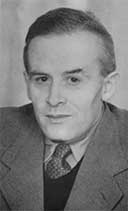|
Journal |
|
|

|
Walter Bruno Henning (1908-1967) was
born August 26, 1908, in Rangy near Tilsit, East Prussia, the son of a
Surveyor in governmental service. After attending high school in his
home province, he enrolled at the University at Göttingen in 1926
continuing, at first, his interest in mathematics. On finishing
gymnasium, Henning had been assured by one of his professors that he
would do well in any academic pursuit he might follow except languages.
Once at Göttingen, however, his interests moved from mathematics to
Iranian languages and under the guidance of the eminent Iranian scholar,
F. C. Andreas, Henning acquired a thorough knowledge of Avestan, the
Middle Persian dialects, and Sogdian. These studies, together with his
interest in the history of religion, led him to the study of
Manichaeism. In 1931 he received his Ph.D. summa cum laude, and in the
following year published an article on a Manichaean cosmological hymn.
This work at once placed him in the forefront of an international group
of scholars who tried to reconstruct the dogmas and liturgy of that
great, noble, and weird creed from hundreds of fragments, often tiny
pieces of paper, excavated in Chinese Turkistan.
Between 1932 and 1936, as the recipient of
various scholarships and supported partly by the Preussische Akademie
der Wissenschaften, Henning published more articles on Manichaean
themes, a topic which fascinated him throughout his life. Foremost among
them was his publication, based on the literary remains of his teacher,
F. C. Andreas, of the monumental Mitteliranische Manichaica aus
Chinesisch-Turkestan. Unwilling to submit to the requirements
established by the Nazi regime for habilitation and therefore unable to
secure a university appointment in Germany, Henning moved to England in
1936 where he soon married his fiancée, Maria Polotsky, the sister of
the great Semitic and Coptic scholar, Hans Jakob Polotsky. From then
until 1961 Henning taught at the School of Oriental and African Studies,
University of London, first as a lecturer, then as a reader. In 1947 he
was appointed Professor of Central Asian Studies and served as head of
the Department of Near and Middle East from 1958 to 1961. Twice he
visited the United States; in 1946 as visiting Professor of Indo-Iranian
at Columbia University and in 1956, for a few months, as a member of the
Institute of Advanced Study in Princeton. In 1961 Henning was appointed
Professor of Iranian Studies in the Department of Near Eastern Languages
at the University of California, Berkeley, and for the Winter and Spring
quarter of 1967 was named Humanities Research Professor. He died after a
short illness on January 8, 1967, leaving his widow and a daughter, Ann
(now Mrs. Theodore Kahle). Henning received many honors in his lifetime.
He was chairman of the Council of the Corpus Inscriptionum Iranicarum,
Fellow of the British Academy, Foreign member of the Royal Danish
Academy, and Corresponding member of the Deutsche Akademie der
Wissenschaften.
-
Zoroaster – Politician or Witch Doctor? (Lecture 1 of 3)
-
Zoroaster – Politician or Witch Doctor? (lecture 2 of 3)
-
Zoroaster – Politician or Witch Doctor (lecture 3 of 3)
|
|